The importance of maintaining academic ethics and upholding ethical standards

What Makes Cyber Security Integral Of Modern Businesses?
In the contemporary digital era, the significance of cyber security in the business landscape cannot be emphasized enough. As reliance on technology and the internet continues to grow, the escalation of sophisticated and frequent cyber threats poses a substantial risk to businesses across various scales.
Cybersecurity is paramount as it shields various data categories, encompassing sensitive information, personally identifiable details (PII), protected health records (PHI), personal data, intellectual property, and governmental or industry information systems, from theft and damage. The absence of a robust cybersecurity program renders an organization vulnerable to data breach campaigns, enticing cybercriminals. With the escalating risks of both inherent and residual threats due to global connectivity and widespread cloud service usage, conventional cybersecurity solutions like antivirus software and firewalls are no longer sufficient. Business leaders must broaden their cybersecurity approach, incorporating comprehensive training to tackle evolving threats such as social engineering, phishing, ransomware, and other malicious activities.
As cyber threats evolve, cyber security is increasingly integral to modern businesses. The growing reliance on digital infrastructure makes organizations vulnerable, necessitating robust defenses. Cyber security certification course are pivotal in preparing individuals for this dynamic field. These courses, offering specialized knowledge in threat detection, prevention, and incident response, empower professionals to safeguard sensitive data and digital assets. With the demand for cyber security experts surging, obtaining a certification enhances one’s skills and serves as a credible entry point into cybersecurity, addressing the pressing need for skilled professionals in the ongoing battle against cyber threats.
Table of Contents
What Is Cyber Security?
Cybersecurity protects computer systems, networks, and digital data from unauthorized access, attacks, or damage. It involves implementing measures to ensure information confidentiality, integrity, and availability, thwarting cyber threats such as malware, ransomware, phishing, and unauthorized access. Cybersecurity comprises a range of technologies, processes, and practices crafted to safeguard digital assets and mitigate the risks associated with the continuously evolving landscape of cyber threats.
Importance of Cyber Security in Business
In the contemporary business landscape, the importance of cybersecurity cannot be overstated, given the pervasive and evolving nature of digital threats. Regardless of size or industry, businesses store and process huge amounts of sensitive data ranging from proprietary information and customer records to financial transactions. Cybersecurity is the frontline defense against many cyber threats that compromise the integrity, confidentiality, and availability of this critical data.
A cyber attack can have severe consequences, including data breaches, financial losses, reputational damage, and legal repercussions. The attack surface expands as organizations increasingly embrace digital transformation, cloud services, and interconnected technologies, making robust cybersecurity measures imperative. Moreover, compliance with data protection regulations and industry standards necessitates the implementation of comprehensive cybersecurity practices.
Beyond safeguarding against external threats, cybersecurity is crucial in mitigating internal risks. Insider threats, unintentional or malicious, pose a significant challenge, and cybersecurity protocols are essential to prevent unauthorized access or unintentional disclosure of sensitive information.
Strong cybersecurity protects an organization’s assets and enhances customer trust and brand reputation. Clients and partners are likely to engage with businesses that safeguard their data. Cybersecurity is integral to businesses’ overall resilience and sustainability in the digital age, ensuring operational continuity and data integrity and maintaining stakeholders’ confidence in an increasingly interconnected and digitally dependent world.
Reason Businesses Need To Adapt Cyber Security
Data Protection: Cybersecurity is crucial for safeguarding sensitive business and customer data, preventing unauthorized access and potential breaches that could lead to data theft or compromise.
Financial Impact: Businesses face significant financial consequences in the aftermath of cyberattacks, including the costs of remediation, potential legal fees, and damage to the company’s reputation, affecting revenue and overall financial health.
Operational Continuity: Cybersecurity measures ensure the uninterrupted operation of critical business functions, preventing disruptions caused by malware, ransomware, or other cyber threats that can compromise systems and networks.
Regulatory Compliance: Sticking to the best cyber security practices helps businesses meet regulatory requirements and industry standards, avoiding legal penalties and reputational damage associated with non-compliance.
Reputation Management: A solid cybersecurity posture is essential for maintaining trust with customers, partners, and stakeholders. A data breach can lead to a loss of confidence, damaging the business’s reputation and potentially losing clients.
Intellectual Property Protection: Cybersecurity safeguards intellectual property, trade secrets, and proprietary information, preventing theft or unauthorized access that could undermine a company’s competitive edge in the market.
Global Connectivity Risks: As businesses increasingly operate on a global scale and leverage cloud services, the attack surface expands, making robust cybersecurity measures vital to counter the rising sophistication of cyber threats.
Employee Awareness: Cybersecurity practices promote a culture of awareness and responsibility among employees, reducing the likelihood of human error, such as falling victim to phishing attacks, often serving as entry points for cybercriminals.
Supply Chain Security: With interconnected supply chains, businesses need cybersecurity measures to ensure the security of their networks and data, preventing cyber threats from spreading through partners or vendors.
Adaptation to Evolving Threats: The dynamic nature of cyber threats requires businesses to continuously adapt and update their cybersecurity strategies to address new vulnerabilities and attack vectors in the ever-changing digital landscape.
Conclusion
Cyber security is an indispensable cornerstone for modern businesses, safeguarding against evolving digital threats that jeopardize data, finances, and reputation. As cyberattacks become more sophisticated, the need for skilled professionals adept in cyber defense is paramount. Undertaking a cyber security certification course not only equips individuals with specialized knowledge in threat mitigation and incident response but positions them as in-demand professionals in the ever-expanding realm of cybersecurity. With businesses recognizing the imperative of robust digital protection, a certified expert becomes a valuable asset, adding up to the resilience and security of organizations in our technology-driven landscape.


